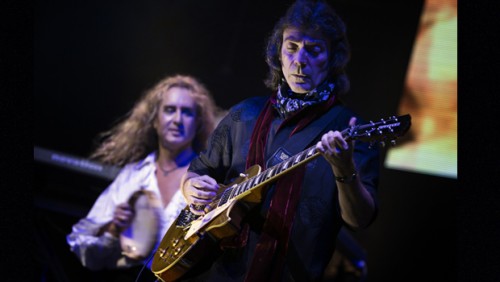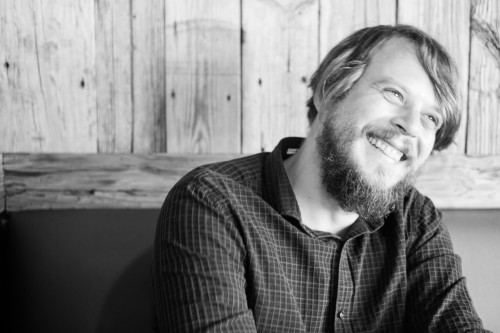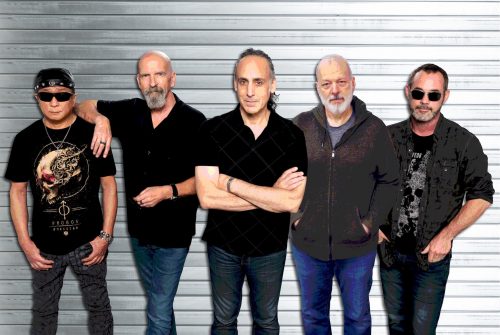By Michael Lello
If you were writing the bible of British progressive rock, you would be well advised to start with the book of Genesis. While the band might be best known for its 1980s and ’90s hits like “Invisible Touch” and “I Can’t Dance,” it was the group’s earlier Peter Gabriel-fronted incarnation that initially put Genesis on the map.
With compositions drawing from classical and folk elements and a theatrical flair thanks to the costumed and frequently masked Gabriel, Genesis’ music flew in the face of the gritty blues-based rock offered up by most if its contemporaries.
Unfortunately for fans of that era’s material, the lineup consisting of Gabriel, Steve Hackett (guitar), Tony Banks (keyboards), Mike Rutherford (bass) and Phil Collins (drums) stopped working together after 1974’s landmark rock opera album, “The Lamb Lies Down On Broadway.” (After Collins took on lead vocals, Hackett remained for two more records, before Genesis continued as a trio after his 1977 exit).
The music, however, has remained dear to Hackett’s heart, and is the focus of his Genesis Revisited project, which has yielded two studio albums as well as “Live At Hammersmith,” a concert album and DVD release which came out last October.
On these releases and accompanying tours, Hackett and collaborators, including prog rock stalwarts like John Wetton (Asia, King Crimson, UK, Roxy Music), Bill Bruford (Yes, King Crimson), Ian MacDonald (King Crimson), Ray Wilson (Stilskin, Genesis), Steve Rothery (Marillion), Steven Wilson (Porcupine Tree) and Neal Morse (Spock’s Beard, Transatlantic) have lent their talents to Hackett’s interpretations of the classic songs.
Hackett and his band are currently on the “Genesis Extended” tour, which includes dates at the Scottish Rite Auditorium in Collingswood, N.J. (Thursday, March 27 and Friday, March 28) and Capitol Theatre in Port Chester, N.Y. (Sunday, March 29).
Hackett recently spoke with Highway 81 Revisited from his home in the Twickenham section of Greater London about his love for the classic Genesis songs, his audition for the band, a then-upcoming meeting with his old bandmates and whether or not he indeed fathered finger-tapping among rock guitarists.
H81R: You have been revisiting Genesis material with this project since 1996, and have spent time recording two albums as well as the tours and live record. Is it safe to assume that in addition to there being a demand for it, you have also enjoyed it?
SH: Absolutely, yes. It’s been fun, and there’s also another forthcoming DVD and album from the Royal Albert Hall show we did in London a while back, so yeah, it’s been extraordinarily successful and also great fun. The audiences have loved it, and it’s felt really good standing in front of them. Bringing back the dream has been fantastic for them and for us.
H81R: Why was it important for you to come back to these songs?
SH: I always had it in the back of my mind that each year that passed it seemed less and less likely that there was going to be a full-band reformation, and even if there was going to be a reformation, there was always going to be a contest as to what tunes were most authentically Genesis, which era they would be from. So from my point of view, all of the time I spent with the band writing and recording and touring those songs during the years 1971 to 1977, obviously that was what I was most attracted to.
But I think of the overall legacy of the wonderful music written by all the guys and I was lucky to be amongst their number. I loved my time with the band, and we were really like a band of brothers at that time. It was extraordinary work that was coming out of everyone, out of a young band. I can’t sing everyone’s praises high enough. I think it was an extraordinary band of writers and players and a lot of extraordinary thinking going on at that time.
H81R: Many players from the progressive genre have distanced themselves from the genre in the passing years. Why have you continued to embrace it?
SH: Well, it’s a funny thing, but I think essentially, at the root of it, this genre, if you like, at the time we didn’t think we were doing music in any genre, we just thought we were doing music without any rules. And I’ve come to realize that what we were making were films for the ear rather than the eye. The storytelling aspect of this which enables you to slip in and out of different characterizations, much like an actor putting on makeup. What it has meant is that it’s a catch-all term in a way, progressive, which means just about anything, to be honest. There isn’t an area that hasn’t been touched, whether it’s been fusion or it’s been rock, blues, something jazz-tinged. It’s really involved everything – moments stolen from opera, even from country music.
People always refer to what I do as progressive, because I think it’s because I refuse to limit myself and say, “No, I won’t touch this area because it’s not English enough, or it’s not commercial enough.” It’s like, each of these different forms are windows on different worlds, and it’s lovely to be able to look in them and inhabit those worlds, and I think it was also magical and mythical and all sorts of things that you can’t quite define, and where other bands have limited themselves perhaps, I always felt well, why can’t you wear a number of different hats? What can’t you sketch in a number of styles and occasionally do a full portrait?
H81R: The guitar heroes of your time – Jimi Hendrix, Jeff Beck, Jimmy Page, Eric Clapton – came from a blues direction, ,but your style is quite different. Where were you coming from stylistically?
SH: I was listening to both blues and baroque music. Most of English rock was based on rhythm and blues, but I think that many of those people were casting an ear much further. People were going back to Bach, listening to that. I remember being hugely influenced by hearing Segovia playing Back on just one nylon guitar in one pass. Eventually of course I did my tribute to that with the tribute album, but I was hugely influenced by blues, and that’s where all of the sonic elements were happening with the guitar. I had to say the blues boom really died on me, as well as it did with most players. I think some blues players came away with a career intact firmly rooted in the blues, such as Eric Clapton or Peter Green, Jimi Hendrix, Jeff Beck in fact, but some moved away from it but had the ability to wander back into it.
I don’t think that was ever really an option for me when I met Genesis first of all. In my audition for the band, I played them three different kinds of music: I played them something that was melodic and on the borders of something that was slightly jazzy with a classical tinge, then I played them something that was completely atonal and dissonant, something that might have suited Miles Davis more than Genesis, and I played a blues piece with my brother, with myself playing harmonica and John playing guitar. And the band said we can use the first one, but the other two we probably won’t touch.
Later on, by the time we had done “The Lamb Lies Down On Broadway,” the band was indulging me with atonal stuff. And so I think it broadened to encompass the influences of the individuals. Phil Collins was into big band and Mel Torme with all the accents that provided, that syncopation; Tony more into classical music at that time; I think Mike Rutherford, folk music, huge fan of early Joni Mitchell; Pete was into everything including musique concrete, and I think everything from Otis Redding to as I say the strangest things, aspects of pantomime and various things. So it was a very eclectic mix.
H81R: You’ve been often credited as the first rock guitarist to use finger-tapping. Is that true?
SH: As far as I know, I was the first person to do it on an electric guitar. Whether or not other players had done it earlier than that, I don’t know. I’ve seen a piece of film purportedly from an Italian guy doing something in the mid-’60s on an acoustic guitar, but that was not something I had seen at the time. So I realize that finger-tapping has become part of the language of what we call heavy metal, but it is a technique which enables you to play extremely fast and go virtually everywhere on the fretboard, so it’s no longer an issue to be the fastest guy in the West. Anyone can do this with a certain amount of practice once you coordinate lifting off, hammering on and lifting off, you can do it and you can skip around. And I believe that it’s become part of the language, part of the rock dictionary.
H81R: When you perform the old Genesis material, does it take you back to the days when you first recorded them?
SH: I think all the time I feel that music is a kind of time machine, and you become the age when you were hugely moved by listening to music that turned you on at the time. It’s also a kind of emotional calendar. If you’re listening to a Beatles tune of a certain time, you always remember the first time you heard that song. That’s the case for me. I’ll remember hearing “I Want To Hold Your Hand” and being at a dance with very young guys listening to that in the early ’60s, and immediately you know what was going on: the fights that were breaking out, all that testosterone with young guys hanging out together, all at school and being beaten into submission. I think there was a lot to fight against at that time, but music does that of course. Watching Buffy Sainte-Marie on stage a couple years ago, watching her sing “Until It’s Time For You To Go,” something like that moves me hugely. I can be moved to tears by that, and I think that’s the effect of music that lasts. If it’s a real song and somebody sings it for you again, it might be three decades that have past, or four or even five, the ’60s are still hugely important to me, not to mention the 1950s of course, where I first started listening to music. The great things still sound great. Elvis singing “Hound Dog” still sounds great. Always will.
H81R: Can you tell us about your band lineup for this tour?
SH: Absolutely, sure. The guys in the band are Nick Beggs on the bass and 12-string. He used to be with Kajagoogoo but has worked with all kinds of people including John Paul Jones. Our singer is Nad Sylvan. Our keyboard player is Roger King. On drums it’s Gary O’Toole, and Rob Townsend on woodwind and brass and percussion and extra keyboard. That’s the band lineup for that coming tour.
H81R: From listening to the albums, it seems like Nad is honoring what Peter did but also putting his own stamp on the songs. How did you come across him and how has he interpreted this music?
SH: He was singing with a band called Agents Of Mercy with Roine Stolt on guitar, operating in the Flower Kings, and Roine also works with Transatlantic with Mike Portnoy. I saw Nad live and was watching some Youtube stuff of him, and heard a version that he’d done of “The Chamber of 32 Doors” (from “The Lamb Lies Down on Broadway”), where the voice just sounded so right, and I just felt that it was an obvious choice.
He does bring something unique to it. There are times when I close my eyes, and I think my God, it sounds so much like one of the Genesis singers, whether it was Phil or Pete, he has an aspect of the two, but he has that kind of soul singer’s voice. When I heard some of his stuff, he sounds more like Marvin Gaye than a white Swedish guy, of course he’s half American as well, so you can’t forget that. I think he brings a lot to it. Not just a great vocal performance, but he’s got a very flamboyant stage presence, so Nad is a whole show in himself. The best lead singers standing there without an instrument around their neck, really to make it work you got to be riveted by what the singer’s doing. The singer’s got to have the confidence in what he does. He presents a whole show apart from what everyone else does because everyone else is playing their instruments. The singer is acting the part, he’s living the song, he’s telling the story. He has to be able to inhabit the spirit of each song, much like a character actor playing a part I think.
H81R: What else do you have planned for the rest of the year when these dates wrap up?
SH: I’m halfway through a new Steve Hackett album. I’m currently this year, other than playing live, I’m not working with Genesis material. So there will be some new stuff for the following year. Because this has taken up two, three years of my life, as I said, bringing back the dream to people who’ve luckily been so enthusiastic.
H81R: What else can you tell us about the new album?
SH: I’ve been using some unlikely instrumentation on it. I’ve been working with certain instruments like the tar. I will be working with some pipes, I found a very fine pipe player, some uilleann pipes. Also there’ll be some aspects of orchestra. Some things that don’t always crop in the world of rock. Didgeridoo, all these things are not really in the mainstream of rock n roll but they help to expand the feeling of the songs. It means we can take them places that weren’t expected. But I probably won’t use any of these things in an entirely straight way. I often think that if I was to employ trad jazz, I want to slow it down and speed it up. I would want to do something that made it very strange. I like to mess with things. I have no reverence for any particular form. I like things to collide and fuse and do strange things.
H81R: Over the years, Peter has been the most reluctant to reunite with the old lineup, but in interviews, he seems to be more open to the idea lately. Do you think it’s possible?
SH: I don’t have a crystal ball. I’m seeing them all tomorrow, as it happens, but nobody has a crystal ball with this. There are many separate agendas, whereas we shared one common goal at one time, everyone knows that I’m up for it, but I’ll let you know after tomorrow. That’s not ostensibly why we’re all coming together. There’s always something else on the table. No one will be more surprised than me if that’s the result of us coming together. Maybe this guy can’t do it because he’s doing music for FIFA, and another guy is scoring music for a movie for Disney, and another guy’s got a tour. There’s a lot of things in the way. God, I think the last time we had a gig was [1982]. Decades come and go, but I have to say that I doubt that there will be any complete reformation. I don’t think it’s likely to happen. I’ve always been up for it, it’s possible but highly improbable, but I’d like to be pleasantly surprised.
H81R: What is the meeting about?
SH: Well, there is something that’s on the cards, but I don’t want to be the one to spill the beans because the agenda may have entirely changed by tomorrow, so I think it might be unlikely to talk about it at this stage. But what it is not is a proposal for a live performance of the five guys. That is what it is not. I’m not allowed to say what it is at this stage because it could be very bad luck.




Did anyone hear the agenda and/or outcome of the meeting Steve mentioned at the end?
Jeff, I mentioned it to him at the show in New Jersey in March, and he said “everything is still hush hush.” So who knows? I’d be surprised at a reunion tour, but stranger things have happened.
Does anyone know if the Genesis Extended/Revisited tour is going further afield than US/UK? Australia for example?